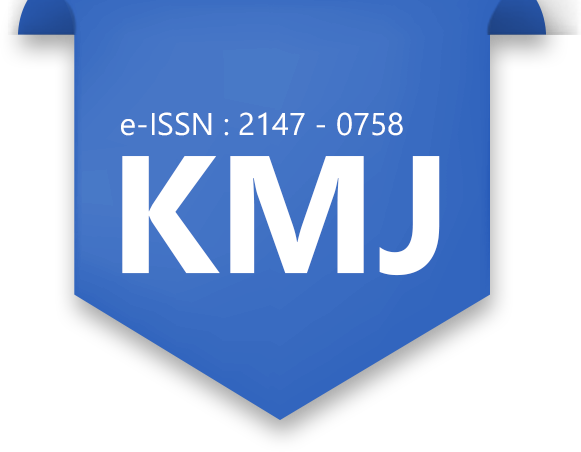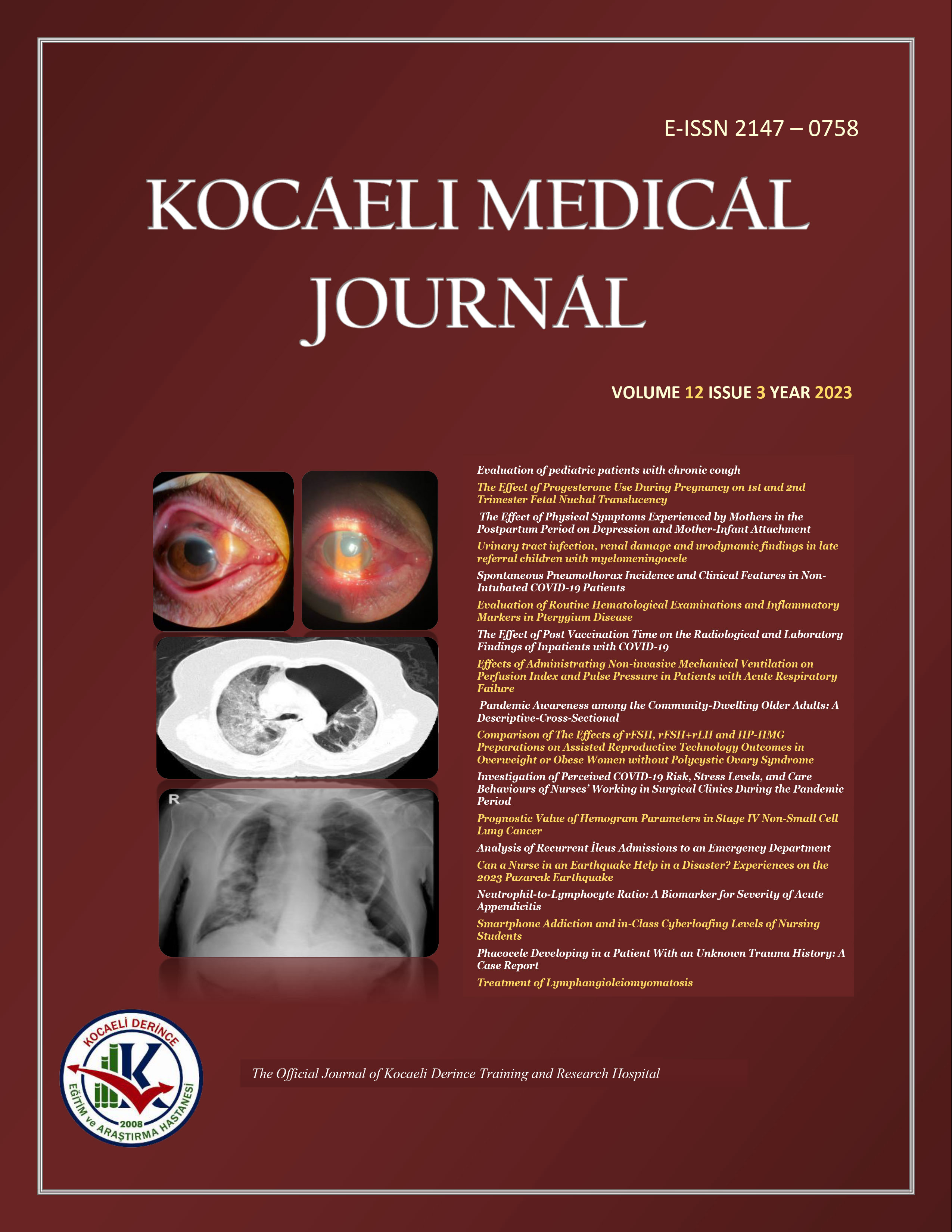
Is There a Relationship Between NRS-2002 Score and NT-pro BNP in Patients With Decompensated Chronic Heart Failure?
Gülay AydınDepartment of Cardiology, University of Health Sciences Darıca Farabi Training and Research Hospital, Kocaeli, TurkeyINTRODUCTION: The aim of this study was to investigate whether there was a relationship between Nutritional Risk Screening (NRS-2002) score and N Terminal-Pro B type Natriuretic Peptide (NT-pro BNP) level in intensive care unit (ICU) patients with decompensated chronic heart failure (CHF).
METHODS: Consecutive 125 patients who were diagnosed with decompensated CHF and whose nutritional status were evaluated using NRS-2002 score were included in this study. The patients were divided into two groups: NRS-2002 score <3 and NRS-2002 score ≥3. The patients with NRS-2002 score ≥3 were defined as malnutrition. After evaluation, the patients were followed up for one-year.
RESULTS: Of the 125 decompensated CHF patients, 93 (74.4 %) were in the NRS-2002 score ≥3 group and 32 (25.6%) were in the NRS-2002 score <3 group. Malnutrition rate was found 74.4% of the patients. The median NT-pro BNP level was 9327 (4927-15793) pg/mL in the NRS-2002 score ≥3 group and the median NT-pro BNP level was 3953 (2310-8939) pg/mL in NRS-2002 score <3 group. When the two groups were compared, median NT-pro BNP level was higher in NRS-2002 score≥3 group and this finding was statistically significant (p=0.005). During the one-year follow up period, 7 (21.9%) patients in NRS-2002 score<3 group and 28 (30.1 %) patients in NRS-2002 score≥3 group; total 35 (28%) patients died.
DISCUSSION AND CONCLUSION: CHF is one of the leading causes of mortality and morbidity. NT-pro BNP level was higher in NRS-2002 score≥3 group than NRS-2002 score<3 group in patients with decompensated CHF (p= 0.005).
Dekompanse Kronik Kalp Yetmezliği Olan Hastalarda NRS-2002 Skoru ile NT-pro BNP Arasında Bir İlişki Var mı dır?
Gülay AydınSağlık Bilimleri Üniversitesi Darıca Farabi Eğitim ve Araştırma Hastanesi, Kardiyoloji Bölümü, Kocaeli, TürkiyeGİRİŞ ve AMAÇ: Bu çalışmanın amacı, yoğun bakım ünitesinde yatan dekompanse kronik kalp yetmezliği (KKY) olan hastalarda Nutrisyonel Risk Tarama (NRS-2002) skoru ile N Terminal-Pro B tipi Natriüretik Peptit (NT-pro BNP) düzeyi arasında bir ilişki olup olmadığını araştırmaktır.
YÖNTEM ve GEREÇLER: Bu çalışmaya dekompanse KKY tanısı konulan ve beslenme durumu NRS-2002 skoru ile değerlendirilen ardışık 125 hasta dahil edildi. Hastalar iki gruba ayrıldı: NRS-2002 skoru <3 ve NRS-2002 skoru ≥3. NRS-2002 skoru ≥3 olan hastalar malnütrisyonlu olarak tanımlandı.
BULGULAR: 125 dekompanse KKY hastasının 93'ü (%74,4) NRS-2002 skoru ≥3 grubunda ve 32'si (%25,6) NRS-2002 skoru <3 grubundaydı. Hastaların %74,4'ünde malnütrisyon bulundu. NRS-2002 skoru ≥3 grubunda ortalama NT-pro BNP seviyesi 9327 (4927-15793) pg/mL ve NRS-2002 skoru <3 olan grupta ortalama NT-pro BNP seviyesi 3953 (2310-8939) pg/mL idi. İki grup karşılaştırıldığında, ortalama NT-pro BNP düzeyi, NRS-2002 skoru≥3 grubunda daha yüksekti ve bu bulgu istatistiksel olarak anlamlıydı (p=0,005). Bir yıllık takip döneminde NRS-2002 skoru<3 grubunda 7 (%21,9) hasta ve NRS-2002 skoru≥3 grubunda 28 (%30,1) hasta; toplam 35 (%28) hasta öldü.
TARTIŞMA ve SONUÇ: KKY, mortalite ve morbiditenin önde gelen nedenlerinden biridir. NT-pro BNP düzeyi, dekompanse KKY'li hastalarda NRS-2002 skoru≥3 grubunda NRS-2002 skoru<3 grubuna göre daha yüksek bulundu ( p= 0,005).
Corresponding Author: Gülay Aydın, Türkiye
Manuscript Language: English












